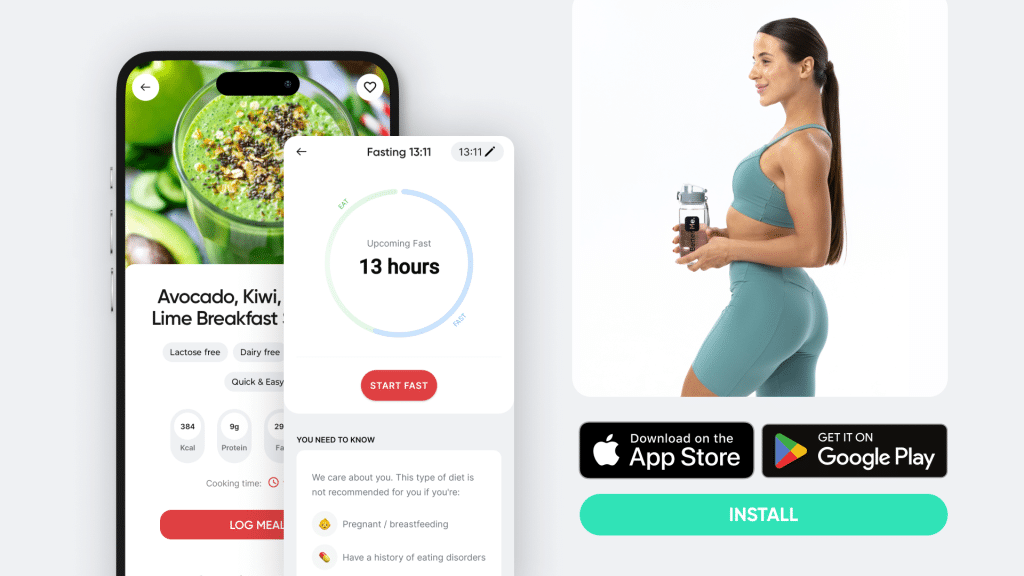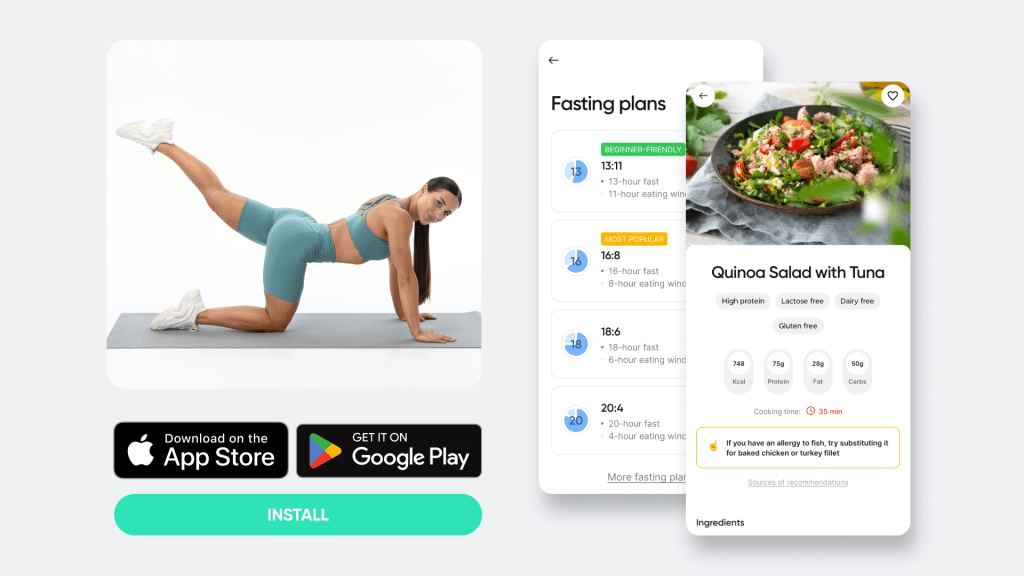Intermittent fasting is one of the most researched and well-known dieting strategies out there. It’s theorized to be good for weight loss, blood sugar control, and even brain health. It’s also quite versatile, with different protocols to suit different goals and preferences. But like any diet or lifestyle change, there can be some downsides. In this article, we’ll go over some of the most common side effects of intermittent fasting and what you can do to minimize them. We’ll also point out when you should quit fasting altogether and see a doctor.
What Are Intermittent Fasting Side Effects?
Keto Flu
The keto flu refers to a group of symptoms that can occur when people transition to a ketogenic diet.
It’s thought to be caused by the sudden loss of carbs and sugar from the diet, which can lead to electrolyte imbalances, dehydration, and other issues (3).
Symptoms of the keto flu include fatigue, headache, brain fog, nausea, and irritability (3).
People who are new to fasting may experience similar symptoms, especially if they’re coming from a diet high in carbs and sugar.
To minimize the risk of keto flu when fasting, make sure to stay hydrated, have enough salt, and get sufficient electrolytes. You can also try starting with shorter fasting periods and gradually increasing the duration as your body adjusts.
Fortunately, the keto flu is usually only temporary and goes away on its own after a week or two. If your symptoms are severe or ongoing, stop fasting and talk to your doctor.
Low Blood Sugar
One of the main reasons people do intermittent fasting is to improve their blood sugar control. However, fasting can sometimes cause low blood sugar, particularly in people with diabetes (8).
Symptoms of low blood sugar include weakness, irritability, sweating, and shaking. If left untreated, low blood sugar can lead to a coma and even death (7).
To minimize the risk of low blood sugar when fasting, people with diabetes should check their blood sugar levels frequently. If you start to feel any symptoms of low blood sugar, eat or drink something with carbs right away.
You may also want to consider using a continuous glucose monitor, which can help you track your blood sugar levels throughout the day. If you experience any symptoms of low blood sugar, eat or drink something sugary right away and see a doctor if the symptoms don’t go away.
If you have diabetes or prediabetes and are considering intermittent fasting, be sure to talk to your doctor first.
Due to the risk of low blood sugar, there are certain groups of people who should not fast, including pregnant women, children, adolescents, and people with diabetes (8). If you have any medical conditions, talk to your doctor before starting to fast.
Read More: 10 Intermittent Fasting Mistakes People Make And How To Avoid Them
Dehydration
When you’re fasting, a couple of changes take place in your body that can lead to dehydration.
For one, if you’re not taking in any fluids, you’re already at a deficit. Additionally, your body starts to release more water when it’s in a fasting state. This is because you are first using up your glycogen stores, which have water associated with them.
Dehydration can cause headaches, fatigue, brain fog, and dizziness. It can also lead to more serious issues like kidney stones and heat stroke (10).
To minimize the risk of dehydration, make sure to drink plenty of water when you’re fasting. Whenever you break your fast, drink electrolyte-rich fluids like coconut water or bone broth. You can also add a pinch of salt to your water to help replenish electrolytes.
If you’re going to be exercising during your fast, be extra cautious about dehydration and make sure to drink even more fluids. If you still experience dehydration or other symptoms when exercising in a fasted state, consider altering your routine so that you exercise after breaking your fast.
Hunger
It’s hardly surprising that hunger is a common side effect of fasting. After all, you’re not eating for an extended period of time.
Fortunately, hunger is usually only temporary and goes away after a few days of fasting. As your body adjusts to using stored energy, you’ll find that you don’t feel as hungry.
If hunger is a constant issue, it could be a sign that you’re not fasting correctly. Make sure you’re only fasting for the recommended amount of time and not going too long without eating. You may also want to consider changing the type of fasting you’re doing.
While some hunger is normal, you’ll know you’re overdoing the fasting when (1):
- You feel faint or dizzy
- You have a headache
- You feel irritable or anxious
- Your stomach growls excessively
If you experience minor hunger symptoms, try drinking unsweetened black coffee or tea, which can help curb hunger. You can also try eating a small amount of protein or fat, such as a hard-boiled egg or a handful of nuts.
Eating a little food that has no carbs can help you stay on track without kicking you out of ketosis or breaking your fast.
If you find that hunger is a constant issue, it may be best to try a different approach to fasting. Shortening your fasting window or fasting every other day may help.
You may also want to consider adding more protein and fat to your meals during your eating window, as this can help you feel full longer.
Irritability And Mood Swings
Your mood may also take a hit when you’re fasting. This is likely due to a combination of hunger, lack of sleep, and dehydration.
When you’re hungry, your blood sugar levels drop, which can cause irritability and mood swings. Dehydration can also lead to these symptoms (7, 10).
To help combat irritability and mood swings, make sure you’re drinking plenty of fluids, getting enough sleep, and eating a balanced diet. Adding some healthy fats, like omega-3s, to your diet may also help.
Practicing self care while you’re fasting, such as taking a relaxing bath or reading a good book, can also help improve your mood.
If these symptoms start interfering with your quality of life or relationships, consider dialing back your fasting regimen.
BetterMe app will kick you out of the mental funk, shake off your extra weight, rid you off your energy-zapping habits, and help you sculpt the body of your dreams. Intrigued? Hurry up and change your life for the better!
Digestive Issues
There are several ways intermittent fasting affects your digestive system, depending on how long you fast and what you eat when you break your fast.
If you’re fasting for 12 hours or less, you’re unlikely to experience any major digestive issues. In fact, some people find that fasting improves their digestion.
However, if you’re fasting for more than 12 hours, you may start to experience indigestion, heartburn, and constipation (1). This is because your digestive system slows down when you don’t eat for a long period of time.
When you don’t eat enough fiber during your eating window, you may also experience constipation. To help combat this, make sure to eat plenty of high-fiber foods, such as fruits, vegetables, and whole grains.
Drinking plenty of fluids can also help keep things moving through your digestive system.
Breaking your fast with the wrong foods can also lead to digestive issues. Eating too much too quickly, or eating high-fat meals, can cause indigestion, heartburn, and nausea. It may also trigger a bout of diarrhea especially if you’re breaking a long fast (6).
Eating smaller meals more slowly can help you avoid these issues. Breaking your fast with easily digestible foods, such as soup or smoothies, can also be a good idea.
Fatigue
One common side effect of intermittent fasting is fatigue. This is likely due to a combination of factors, such as hunger, lack of sleep, and dehydration.
When you’re hungry, your blood sugar levels drop, which can lead to feelings of fatigue. Dehydration can also cause fatigue (7, 10).
To help combat fatigue, make sure you’re drinking plenty of fluids, getting enough sleep, and eating a balanced diet. Adding some healthy fats, like omega-3s, to your diet may also help.
Practicing self care while you’re fasting, such as taking a relaxing bath or reading a good book, can also help you wind down and get some rest.
Coffee is a good pick-me-up when you’re feeling tired, but make sure to drink it black as adding milk or sugar will break your fast.
If none of this helps, you may be overdoing it with your fasting regimen and should consider easing up by fasting on fewer days of the week or shortening your fasting time.
Read More: Intermittent Fasting Snacks: 10 Plus Healthy Bitings That Will Help You Stay On Track
Hormone Imbalances
Intermittent fasting can cause hormone imbalances in some people, particularly women. This is because fasting can disrupt the delicate balance of hormones in your body. Hunger, lack of sleep, and stress can all lead to hormone imbalances.
Here are some of the hormones affected by intermittent fasting over time:
Cortisol
When you’re fasting, your body is in a constant state of stress, which can cause your adrenal glands to produce more cortisol (5).
Cortisol is a stress hormone that helps regulate metabolism, but too much of it can lead to weight gain, anxiety, and other health problems (5).
To help balance your cortisol levels, make sure you’re getting enough sleep and practicing stress-relieving activities like yoga or meditation.
Estrogen
This hormone is important for regulating the menstrual cycle, but too much or too little of it can lead to problems.
Fasting can cause changes in estrogen levels. The reason for this is not fully understood, but it may be due to the fact that fasting can lead to weight loss, and body fat cells produce estrogen (4).
Weight loss can cause a decrease in estrogen levels, which can lead to irregular periods, hot flashes, and other menopausal symptoms. It can also put you at a higher risk for osteoporosis (4).
To help balance your estrogen levels, make sure you’re eating a balanced diet that includes plenty of fruits and vegetables. You should also avoid processed foods and excessive amounts of caffeine and alcohol.
Maintaining a healthy weight and not losing too much weight or too rapidly can also help.
Progesterone
Progesterone is another hormone that can be affected by intermittent fasting. This hormone helps regulate the menstrual cycle and prepares the body for pregnancy.
The reason behind this is not fully understood, but it may be due to the fact that fasting can lead to weight loss (4).
Weight loss can cause a decrease in progesterone levels, which can lead to irregular periods and other menstrual cycle problems (4).
To help balance your progesterone levels, make sure you’re eating a balanced diet that includes plenty of fruits and vegetables. You should also avoid processed foods and excessive amounts of caffeine and alcohol.
Maintaining a healthy weight and not losing too much can also help.
Insulin
Intermittent fasting has been suggested as an effective way to regulate blood sugar levels and improve insulin resistance. How this may work is that when you fast, your body is forced to use stored sugar for energy first, which may help to regulate blood sugar levels and improve insulin sensitivity (5).
However, it’s not all good news when it comes to intermittent fasting and diabetes. While this type of fasting can help to regulate blood sugar levels, it can also cause them to spike if you’re not careful (5).
This is because there’s a chance that your blood sugar could drop too low if you’re not eating enough food. When you do eat, your body will release a large amount of insulin to try to bring your blood sugar back up to normal levels.
If you’re not careful, this can cause your blood sugar to spike and lead to problems like low energy levels, and cravings.
That’s why it’s important to talk to your doctor before starting any type of fasting plan, especially if you have diabetes or prediabetes. They can help you create a plan that will work for you and make sure that you’re doing it safely.
Bad Breath
You might notice that your breath smells bad when you’re fasting. This is because your body is breaking down fat for energy, and this process produces a byproduct called ketones (9).
Ketones are a type of acid that can make your breath smell bad (9). The best way to get rid of ketone breath is to drink plenty of water and chew sugar-free gum or mints.
You can also try using a mouthwash that contains zinc, which can help to neutralize the odor of ketones.
Proper hydration is the surest way to avoid problems with bad breath during fasting.
Lean and toned up body isn’t just a far-fetched fantasy. Check out the BetterMe app and watch it propel your weight loss journey into high gear!
Poor Sleep
Sleep disturbances such as insomnia are common during fasting. This is because your body is going through a lot of changes, and this can disrupt your sleep cycle.
There are a few things you can do to help improve your sleep while fasting. First, make sure that you’re staying hydrated by drinking plenty of water throughout the day.
You should also avoid caffeine and alcohol in the evening, as these can make it harder to fall asleep. And, lastly, try to stick to a regular sleep schedule as much as possible.
If you’re having trouble sleeping, talk to your doctor about other ways to improve your sleep habits.
Malnutrition
Fasting puts you at risk for malnutrition, which is when your body doesn’t get the nutrients it needs to function properly.
This can happen if you’re not eating enough food, or if you’re not getting the right mix of nutrients (2). For example, if you’re only eating protein and fat, but not carbs, your body won’t have the energy it needs to function properly.
To avoid malnutrition, make sure you’re eating a balanced diet that includes all the major food groups. You can also try to eat smaller meals more often, instead of large meals less often.
If you’re concerned that you’re not getting enough nutrients, talk to your doctor about taking a multivitamin or other supplements.
Interaction With Certain Medications
Fasting can be dangerous if you’re taking certain medications, such as insulin or blood pressure medications. This is because fasting can cause your blood sugar to drop too low, or your blood pressure to drop too low (1).
If you’re taking any kind of medication, it’s important to talk to your doctor before you start fasting. They can help you make sure that it’s safe for you to fast, and they can adjust your dosage if necessary.
People who need to take medications with food to avoid stomach irritation should not try intermittent fasting.
How To Reduce Intermittent Fasting Side Effects
Unless you have a medical condition, there are usually ways to mitigate any side effects you may experience while fasting.
Ease Into IF
This is by far the best way to reduce or even avoid most of the side effects associated with intermittent fasting.
Start by incorporating a 12-hour fast a few days a week, and then gradually increase the length of your fasts as your body adjusts.
You can also start with shorter fasts, like a 16:8 or 18:6, and then work your way up to longer fasts, like a 20:4 or 22:2.
Drink Plenty Of Water
As with any diet or lifestyle change, it’s important to stay hydrated when you’re intermittent fasting.
Make sure you’re drinking at least 8 glasses of water a day, and more if you can (11). You can also drink other fluids like unsweetened tea or coffee, or sparkling water. Avoid sugary drinks, alcohol, and caffeinated beverages, as these can dehydrate you.
Eat A Healthy Diet
When you’re intermittent fasting, it’s even more important to eat a healthy balanced diet.
Make sure you’re getting plenty of fruits, vegetables, whole grains, healthy fats, and lean protein. And, avoid ultra processed foods, added sugars, and excessive amounts of unhealthy fats.
If you need help making sure you’re eating a balanced diet, talk to a registered dietitian or your doctor.
Get Enough Sleep
As we mentioned before, sleep can be disturbed when you’re intermittent fasting.
To help improve your sleep, stick to a regular sleep schedule as much as possible. Avoid caffeine and alcohol in the evening, and make sure you’re staying hydrated throughout the day.
If you’re having trouble sleeping, talk to your doctor about other ways to improve your sleep habits.
Take A Break
If you’re finding that the side effects of intermittent fasting are too much to handle, or if you’re not seeing the results you want, take a break from fasting.
You can always start again later, at a different frequency or duration. Or, you can try a different type of fasting, like time-restricted feeding.
The Bottom Line
Intermittent fasting is generally safe for many people, but there are some side effects that you should be aware of.
If you’re considering this type of diet, be sure to talk to your doctor first to make sure it’s safe for you. And, if you do start fasting, be sure to pay attention to your body and how it’s reacting. If you start to experience any side effects, stop fasting and talk to your doctor.
DISCLAIMER:
This article is intended for general informational purposes only and does not serve to address individual circumstances. It is not a substitute for professional advice or help and should not be relied on for making any kind of decision-making. Any action taken as a direct or indirect result of the information in this article is entirely at your own risk and is your sole responsibility.
BetterMe, its content staff, and its medical advisors accept no responsibility for inaccuracies, errors, misstatements, inconsistencies, or omissions and specifically disclaim any liability, loss or risk, personal, professional or otherwise, which may be incurred as a consequence, directly or indirectly, of the use and/or application of any content.
You should always seek the advice of your physician or other qualified health provider with any questions you may have regarding a medical condition or your specific situation. Never disregard professional medical advice or delay seeking it because of BetterMe content. If you suspect or think you may have a medical emergency, call your doctor.
SOURCES:
- 4 intermittent fasting side effects to watch out for (2020, harvard.edu)
- Clinical Management of Intermittent Fasting in Patients with Diabetes Mellitus (2019, nih.gov)
- Consumer Reports of “Keto Flu” Associated With the Ketogenic Diet (2020, frontiersin.org)
- Effects of Fasting on Neuroendocrine Function and Follicle Development in Lean Women (1998, oup.com)
- Effects of Intermittent Fasting on the Circulating Levels and Circadian Rhythms of Hormones (2021, nih.gov)
- Health Effects of Alternate-Day Fasting in Adults: A Systematic Review and Meta-Analysis (2020, nih.gov)
- Low Blood Glucose (Hypoglycemia) (2021, nih.gov)
- Low fasting glucose and future risks of major adverse outcomes in people without baseline diabetes or cardiovascular disease: a systematic review and meta-analysis (2019, nih.gov)
- Measuring breath acetone for monitoring fat loss: Review (2015, nih.gov)
- Public knowledge of dehydration and fluid intake practices: variation by participants’ characteristics (2018, nih.gov)
- Water: How much should you drink every day? (2020, mayoclinic.org)












